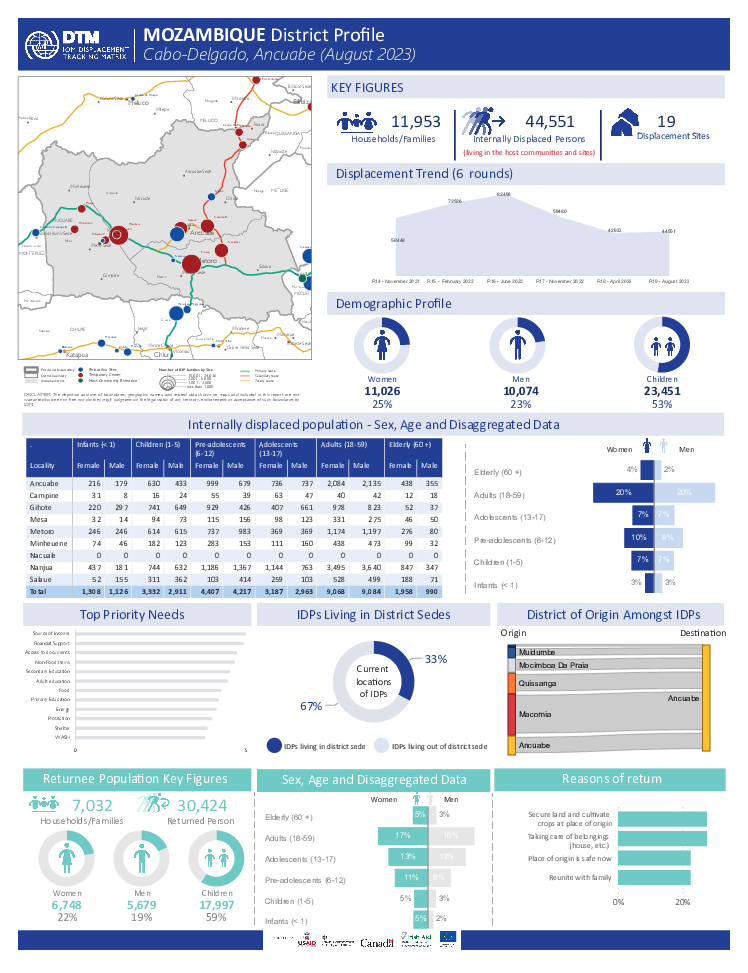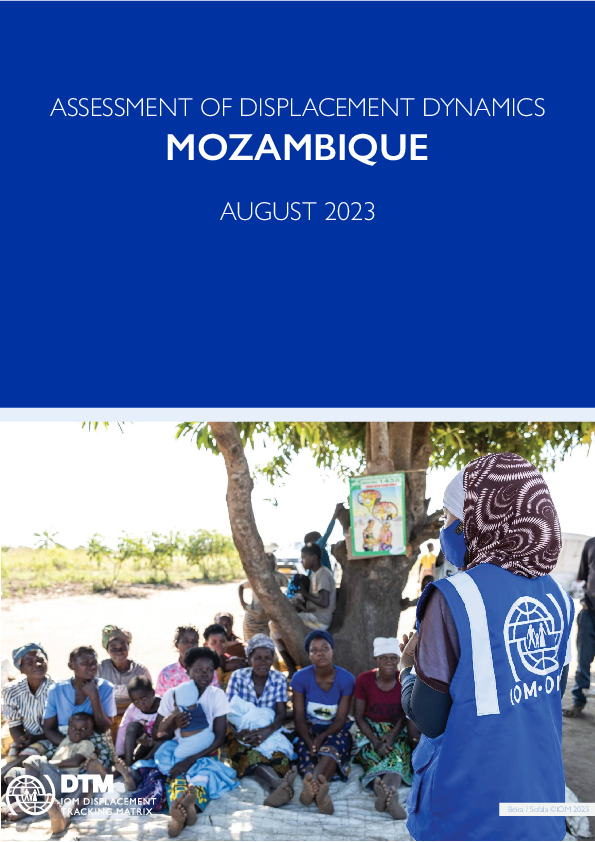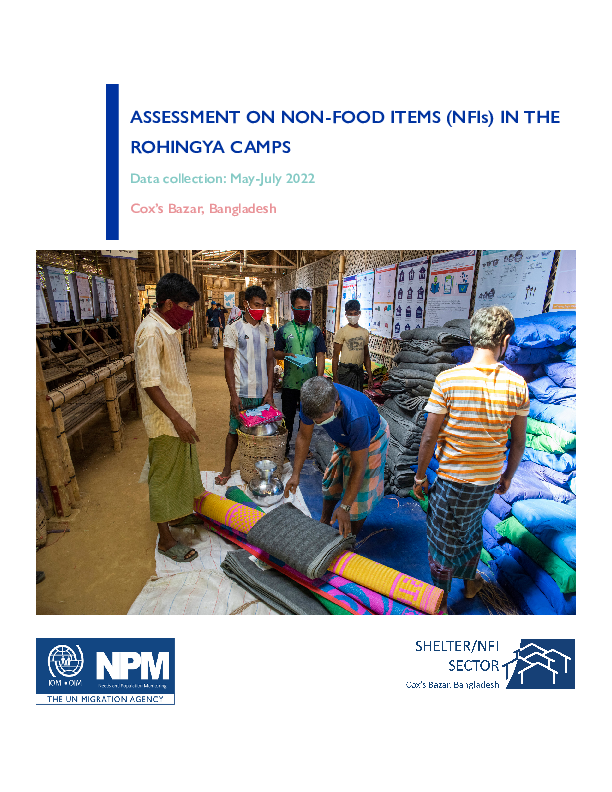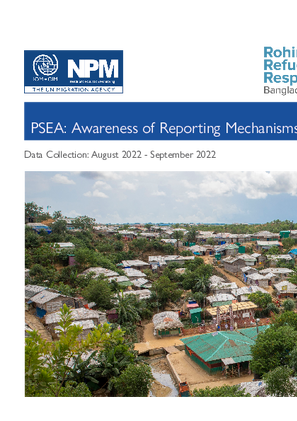-
Countries
-
Data and Analysis
-
Special Focus
-
Crisis Responses
Contact
DTM Nigeria, iomnigeriadtm@iom.int
Location
Nigeria
Activity
- Mobility Tracking
- Site Assessment
Period Covered
Dec 28 2022 -Feb 04 2023
A site assessment is a sub-component of mobility tracking. It aims to collect data on population presence, living conditions and needs in a particular displacement site or community.
Data collection for IDPs took place between December 2022 and February 2023 in 2,482 localities in the six states of north-east Nigeria (Borno, Adamawa, Yobe, Gombe, Taraba and Bauchi).
As of February 2023, the DTM identified 2,388,703 IDPs in 488,163 households. The IDP population included IDPs in camps and camp-like settings (834,836 individuals or 35%) and IDPs residing in host communities (1,553,867 individuals or 65%).
Population Groups
Survey Methodology
Unit of Analysis Or Observation
Type of Survey or Assessment
Keywords
Geographical Scope
Administrative boundaries with available data
The current dataset covers the following administrative boundaries

Contact
DTM Mozambique, DTMMozambique
Language
English
Location
Mozambique
Period Covered
Jul 12 2023
Aug 04 2023
Activity
- Mobility Tracking
- Site Assessment
This summary presents findings of the 19th round of Mobility Tracking Assessments (previously known as Baseline Assessments) conducted across Northern and Central Mozambique through key-informant assessments and group interviews at location level between July and August 2023. Mobility Tracking assessments estimate the presence of internally displaced persons (IDPs) and returnees across Mozambique. IOM DTM mapped a total of 850,599 IDPs and 571,468 returnees in 325 locations. Overall increase on the number of IDPs and Returnees is attributable to the widened coverage. Comparing with previous assessments which covered only Northern Mozambique, the July-August 2023 assessment was widened to cover Manica, Sofala, Tete and Zambezia provinces.

Contact
DTMLibya@iom.int
Language
English
Location
Libya
Snapshot Date
Sep 10 2023
Activity
- Other
On Sunday, 10 September 2023 storm Daniel made landfall in Libya causing severe weather conditions, including strong winds and sudden heavy rainfall affecting the northeastern areas of Benghazi, Tobruk, Toukra, Talmeitha, Almarj, Taknes (Al Jabal Al Akhdar), Al Owailia, Bayada, Albayda, Shahhat, Sousa and Derna. The storm reportedly led to significant infrastructure damage, including road network, disrupted the telecommunications network, and caused the displacement of at least 410 families (or around 2,050 individuals) and 35 migrants.

Contact
DTM Mozambique, DTMMozambique@iom.int
Language
English
Location
Mozambique
Period Covered
Jul 12 2023
Aug 04 2023
Activity
- Mobility Tracking
- Baseline Assessment
This summary presents findings of the 19th round of Mobility Tracking Assessments (previously known as Baseline Assessments) conducted across Northern and Central Mozambique through key-informant assessments and group interviews at location level between July and August 2023. Mobility Tracking assessments estimate the presence of internally displaced persons (IDPs) and returnees across Mozambique. IOM DTM mapped a total of 850,599 IDPs and 571,468 returnees in 325 locations. Overall increase on the number of IDPs and Returnees is attributable to the widened coverage. Comparing with previous assessments which covered only Northern Mozambique, the July-August 2023 assessment was widened to cover Manica, Sofala, Tete and Zambezia provinces.

Contact
NPM Bangladesh, npmbangladesh@iom.int
Language
English
Location
Bangladesh
Period Covered
May 01 2022
Jun 30 2022
Activity
- Survey
- Community Perception
Following the devastating flash floods in May and June 2022 in the districts of Sylhet and Sunamganj, the Displacement Management Cluster, Gender Based Violence (GBV) Cluster, Shelter Cluster and Education Cluster collaborated to assess the flood evacuation centres through partners currently active in the affected areas. Information was collected on the situation in the centres during the flood, the present conditions of the centre and the challenges. In Bangladesh, evacuation centres are known as cyclone centres and/or flood shelters (depending on the geographical location) where displaced people take shelter during disasters, and they are usually multifunctional. Support for the assessment was provided by the IOM Needs and Population Monitoring (NPM) team who has expertise in data collection and information management through FGDs with KIs (Key Informants)

Contact
NPM Bangladesh, npmbangladesh@iom.int
Language
English
Location
Bangladesh
Period Covered
Feb 01 2022
Jul 30 2022
Activity
- Survey
- Community Perception
Rohingyar Hobor (Rohingya news) is a regular trends report produced by IOM Needs and Population Monitoring (NPM), IOM’s Protection Unit (Research and Consultations team), and ACAPS. Its objective is to better explain the Rohingya’s wellbeing in the camps and their perception and recounting of recent events that affect their lives. These reports draw upon qualitative and quantitative data collected from 20 different sub-blocks across Kutupalong Balukhali Expansion as part of a longitudinal research exploring welfare through the Rohingya’s access to assistance, economic conditions, and relationships within the response. No data was collected in Teknaf for any rounds because all Rohingya researchers and enumerators live in Kutupalong Balukhali Expansion, and movement restrictions prevent them from travelling to Teknaf to conduct consultations. The first report in this series was published in May 2021, and a total of four rounds have been completed so far Topics identified in the last round as important to the Rohingya were the market demolitions in the camps, educational needs of children, emerging skin diseases, increased feelings of insecurity, stress among the population, and relocation to Bhasan Char. In round 4, topics discussed included the limited social connectedness within communities, increased negative coping strategies, and the need to pay money to be considered for a job in the camps.

Contact
NPM Bangladesh, npmbangladesh@iom.int
Language
English
Location
Bangladesh
Period Covered
May 01 2021
Jun 30 2022
Activity
- Survey
- Community Perception
It has been five years since Rohingya refugees fled from Myanmar to Bangladesh, however the humanitarian response still remains focused on meeting humanitarian needs. A number of humanitarian agencies are supporting them by providing their basic needs and Non-Food Items (NFIs) are one of core necessities of people. The needs for NFIs are expected to continue as the access to income generating activities and livelihood opportunities are still limited for refugees. Considering their needs Shelter/NFI Sector together with NPM conducted a survey to understand people’s opinions on the needs of Non-food Items (NFIs) and information on their existing NFIs. NFIs are non-food items. This assessment focused only on the NFIs that are coordinated by the Shelter/NFI sector (houseware, cooking ware, etc). The assessment did not cover WASH items like jerry cans and buckets.
This summary presents findings of the 19th round of Mobility Tracking Assessments (previously known as Baseline Assessments) conducted across Northern Mozambique through key-informant assessments and group interviews at district and location-level in August 2023. Mobility Tracking assessments estimate the number of Internally Displaced Persons (IDPs) and returnees across northern and central Mozambique. IOM DTM mapped a total of 850,599 IDPs and 571,468 returnees in 335 locations.
Population Groups
Survey Methodology
Unit of Analysis Or Observation
Type of Survey or Assessment
Keywords
Geographical Scope
Administrative boundaries with available data
The current dataset covers the following administrative boundaries

Contact
NPM Bangladesh, npmbangladesh@iom.int
Language
English
Location
Bangladesh
Period Covered
Aug 01 2021
May 30 2022
Activity
- Survey
- Community Perception
In the displacement contexts, it is likely that the psychosocial implications of displacement and the breakdown of the usual protective institutions such as the family, community, government, law enforcement structures, etc. increases the intensity of different protection issues. Since affected populations might have limited awareness of their rights and entitlements in an unfamiliar environment also instigates risks of exploitation and abuse. Although Sexual Exploitation and Abuse (SEA) by humanitarian workers can occur in any humanitarian or development context, in the emergency context there is a higher risk of all forms of misconduct, including SEA 1 as the emergency leads to a rapid increase in the number of partners operating in the humanitarian response, rapid recruitments and staff turnover, high work pressures, and challenges to ensuring effective coordination and oversight. A PSEA network was enacted in 2017 for the prevention of and response to sexual exploitation and abuse. Currently, IOM-NPM in coordination with the PSEA network conducted an assessment to investigate the perception of Rohingya refugees on existing complaints and feedback mechanisms (CFMs) in the camps especially focusing on reporting sensitive issues including Sexual Exploitation and Abuse (SEA). The same assessment was conducted between December 2021 and January 2022 in four different camps (Camps 4 Ext, 13, 15, and 16). In this round, 6 new camps were assessed that employ 90 surveys in each camp.

Contact
iomdtmchile@iom.int
Language
English
Location
Chile
Period Covered
Jun 01 2023
Jul 28 2023
Activity
- Survey
- Flow Monitoring
La localidad fronteriza de Colchane se sitúa a 235 km de Iquique, centro urbano más cercano, y a casi dos mil km de Santiago, capital de Chile. En este lugar se ubica el Centro de Primera Acogida de Colchane, un refugio temporal establecido por el Gobierno de Chile para llevar a cabo el registro de personas refugiadas y migrantes que ingresan por pasos no habilitados. En los últimos años, Colchane ha sido uno de los principales puntos de entrada de personas refugiadas y migrantes al país a través de pasos no autorizados.
La localidad fronteriza de Pisiga Bolívar, conocida comúnmente como Pisiga, se encuentra a 236 km de la ciudad de Oruro y a 461 km de La Paz, capital de Bolivia. En esta área se encuentran diversos puntos de terminales informales que facilitan el transporte de personas desde el interior hacia la frontera con Chile. Debido a su proximidad con la frontera chilena, Pisiga es uno de los principales puntos de tránsito desde Bolivia hacia Chile.